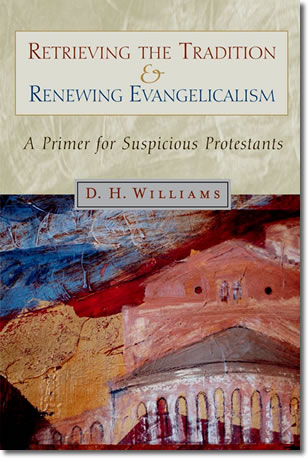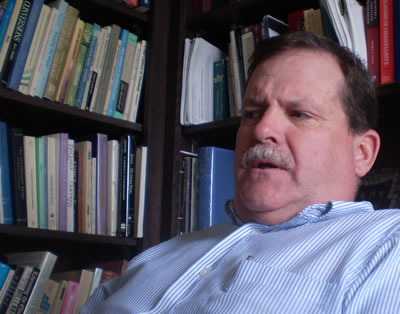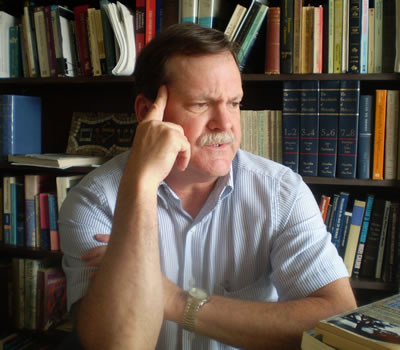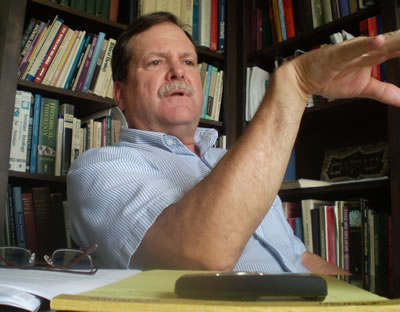Interview:
Prof. D.H. Williams
Patristics and Historical Theology - Baylor University
Dr. Daniel Williams graciously treated me to lunch, then we returned to his office, perched on the sixth floor of the Tidwell Building where Bible and Theology is taught at Baylor University. This was our second meeting. We have now shared 4-5 hours together and we enjoy a relaxed dialogue. I have been pleasantly surprised with how open Professor Williams is about his faith, his opinions on theology, the church, and other issues that might come up. Like me, he served in pastoral ministry prior to doing his Ph.D. work. He is clearly a man of passionate faith and personal conviction.
AB: How did you get interested in Patristics and the Early Church?
DHW: Almost by accident. I was attending Trinity Divinity Seminary in Deerfield in the late 70s. There was nobody there teaching patristics. I was doing a regular MDiv program and one of our Homiletics instructors had decided to do a Ph.D. in Patristics at Princeton late in life. He was approved to teach this course based on his studies and I took the class. For me it was like the opening of a door to a world I had never seen before. It was not just new content within church history, but a new connection with the roots of Christianity.
One of the things I was attracted to fairly quickly is the way in which the early writers did not compartmentalize faith as practice and faith as doctrine. They did not separate faith into the intellectual and the spiritual.
 We are providing Chapter Four of Prof. Williams' book for you here. I urge you to purchase a copy of "Retrieving..." on Amazon if this interview challenges, irritates or encourages you in any way - the book will be instructive.
We are providing Chapter Four of Prof. Williams' book for you here. I urge you to purchase a copy of "Retrieving..." on Amazon if this interview challenges, irritates or encourages you in any way - the book will be instructive.

One of the things I was attracted to fairly quickly is the way in which the early writers did not compartmentalize faith as practice and faith as doctrine. They did not separate faith into the intellectual and the spiritual....For these early writers everything was spiritual. All their ethics and all of their theology was driven by their spirituality.
Right away I was attracted to that, but mainly attracted because it was a foreign way of looking at faith for me. The way I had experienced faith was that we compartmentalize spirituality as one reality, then theology as another thing altogether. Just like the academic guilds are organized. For these early writers everything had a spiritual/divine relation. All their ethics and all of their theology was driven by their spirituality.
This is particularly significant because there are no "theologians" in the early church. On the whole it is bishops or pastors that write the earliest theology for the church. Those that produced the aids for thought life were the same ones who produced Sunday sermons and the devotionals.
In college and seminary, I had learned lots about theology and the New Testament. I learned a lot about the Protestant Reformation, but no one had ever taught me beyond an encyclopedic paragraph about what happened after the apostles. Why the Bible took the shape that it did. I had heard pastors talk about it, but nobody seemed to really know why and how it happened. The same was true about the beginnings of trinitarian doctrine.Within my evangelical circles, no one had a first-hand knowledge as to how and why. I could read a secondary source, but I had no way of proving whether the secondary author was right.
This was the gap which I suddenly found the early church fathers filling in. This was the beginning of my study in the early church.
AB: I know from your publications, and now from personal interaction with you, that you are an advocate for introducing Free Church Protestants to the early church. Why is this important?
DHW: Fundamentally I think we must answer the question, what is the relationship of the individual believer with the Church? Is Christianity and Jesus just for me? Or is there something bigger going on than just my growth, or the growth of my family, my spiritual calling and so forth.
The moment you begin to ask what I will call horizontal questions, you are really asking,
"How are we connected to the Church?"
"How are we connected to the New Testament?"
"How are we connected to the earliest Jesus movement?"
What connects us?
There has been 1900 years gone by...it would seem silly to say that something of value must have happened during all of these years. In general, it's a question of continuity; How are we identified as Christians? Is it based on what I feel? Is it based on what I think? Or is it based on something broader? How am I connected to the Church of the past?
 I was converted later in my life than most, but I was taught that you really did not need to think about these things at all because the Bible was the Word of God and by virtue of being the Word of God there was no need for mediation of any sort, whatsoever. The Bible was God's voice to you in a directly intimate sort of way. All you needed after that was a good sermon on Sundays and you would get what you needed: You know, "Jesus and me under the oak tree."
I was converted later in my life than most, but I was taught that you really did not need to think about these things at all because the Bible was the Word of God and by virtue of being the Word of God there was no need for mediation of any sort, whatsoever. The Bible was God's voice to you in a directly intimate sort of way. All you needed after that was a good sermon on Sundays and you would get what you needed: You know, "Jesus and me under the oak tree."
And I suppose that as you grow you begin to realize how unsatisfying that is. There must be a basis for how we hold the Bible as authoritative like we do. Why do we have those books of the Bible? Who decided that? Where did that decision come from?
We believe in God as Father, Son and Holy Spirit. Well, where does that come from? Those three are certainly mentioned by Paul. There are two mentions of it in the New Testament - but no doctrinal reflections.
We must remember that the English Bible did not fall from heaven and hit us in the forehead! Nor did it hit King James I in the head. And by the way, there were clearly two versions of the New Testament by this time - one with the Apocrypha and one without the Apocrypha.
AB: I think you are answering my next question: What do Christians need to know that they cannot get from the New Testament?
DHW: One thinks of the New Testament as THE deposit of faith (truth) from God to the Church. I think there is a certain amount of Christian maturity expressed like this: the Bible was intended for, and developed by, the Church. It did not just fall from the sky. Christians do not share the view of the sacred text, for example, of the Islamic faith.
Namely, that the Qu'ran is itself the sacred much like God. The fundamentalist perspective of Islam states that the exact text, the very language of the text, must be kept pure and precise. And they claim to have an original text which is the standard.
[AB: This reminds me of Christian fundamentalism. The text is perfect and we cannot stomach the idea that it might not be perfect.]
We do not need to worry about a perfect text. God is perfect. We don't need to defend God either. Christians have never used or defended the Bible in any one language as the only way in which God has revealed Himself. Christians have never done that. Christianity began in a world with Greek, and Syriac, and Latin, and Aramaic...then as it moved west you get new European languages. As the faith moved east you get other languages like Uyghur (pronounced "we-ger"), Sogdian, and eventually Chinese by the sixth century. Not one of these cultural and geographical movements or eras considered the text or the language to be unique for God's revelation. Christians today will read the Bible in English and see that as God's revelation to us. We study Greek and Hebrew in seminary because we are told those are the original languages, but not because we think language "x" is the only chosen language for God's revelation.
To get back on point, the collection of the New Testament as we have it today is a product of the second, third and fourth centuries. Yes, the Apostles wrote it, but it was the churches - as Eusebius of Caesarea explains - that came to recognize it. That is, the Scriptural canonical process came out of the hard work of discernment on the part of the churches over a longer period of time.
[Note: His answer of what Christians need that is not prescribed in the NT is the New Testament itself!
Prof Williams is quick to point out that two very important aspects of Christianity NOT given to us by the New Testament are: the New Testament canon and the doctrine of the trinity.]
AB: Where did this idea originate that the Bible was the perfect, God-breathed Word of God, word for word, exactly as God spoke it to the writers? As the son of an engineer and from a nominal Christian background, when I would question these ideas I was told, "You're trying to think too much. That will get you into trouble. Just believe what we're teaching you and you'll be fine - this is sound doctrine."
DHW: This is going to take us in another direction.
One thing I can say that might be of use, or great frustration, is that this concept did not begin in the Reformation. Luther, Bucer, Calvin...these men were extremely interested in understanding the Bible in light of what the early fathers (second, third and fourth century fathers) had to say. Luther viewed the first five centuries as the critical time for interpreting the Bible. Again, it was an issue of continuity.
Unfortunately, an anti-authoritarian movement is one of the legacies of the Reformation, and took a direction that was originally unintended. The Reformers did not struggle with a question of scripture or tradition - their question was: What is the true tradition that goes along with scripture? Likewise, the Reformation did not reject all church authority; what it rejected was the way in which that authority had been used. It fully accepted the reality of earthly authorities, but it rejected the abuse of authority.
After the Magisterial Reformers (the early Reformers who held a place for the Church under secular authority such as a king, prince or local magistrate - Luther and Calvin are both in this group) the later anti-authoritarian reformers emerged and a new idea of authority began to develop. This view held that the Bible was the ONLY authority needed. It was largely a reactionary move, the result of rejecting the authority of the Roman Church's magisterium.

All Christians are catholics. I used to joke around with my Jesuit colleagues at Loyola, "Who decided that you should have the only claim to the name 'catholic'?" When I say "catholic" I do not mean only Catholics any more than when I say "orthodox" I am referring only to the Orthodox Church, or the Eastern Church.
AB: You mean the Catholics?
DHW: All Christians are catholics. I used to joke around with my Jesuit colleagues at Loyola, "Who decided that you should have the only claim to the name 'catholic'?"
When I say "catholic" I do not mean only Catholics any more than when I say "orthodox" I am referring only to the Orthodox or Eastern Church.
AB: Give me an idea of when this anti-authoritarian movement began.
DHW: By the end of the 16th century the reactions to the Council of Trent (and to the Roman Church) become more caustic, creating a more difficult atmosphere. Trent was the Catholic response to the variegated Protestant Reformation. The reaction to Trent pushes the second wave of reformers further into an anti-Roman, anti-Catholic position. There were some good things Trent said and did, but its effect on the Reformers was to galvanize their opposition rather than bringing any kind of harmony. Luther had wanted to see an ecumenical Council between the Roman Catholic Church and those who were seeking reformation. Reformation is not about destroying what was there, but to reform and improve what exists. Protestants today have some difficulty with this, but Luther's point was never to get rid of all the existing Church structure - he wanted to reform it.
Within certain branches of the Protestant church a new kind of authority begins to take shape. The Bible is called the Word of God. In the early church and even with the early Reformers the Word of God was Christ, the Logos. Within 100 years of Trent the Bible is now seen as the Word of God, the only authority for the Church. The Bible itself begins to be attributed with a divine character. And protections are placed around this belief to keep it safe. The Bible is inerrant - a protection device. I was taught this as a young Christian as a basic assumption of reading my Bible. Does God speak through the Bible? Absolutely. Is the Bible the authoritative words of God? Sure. But the true Word of God, the infallible Word of God is the Son. It is the Logos Himself who gave the words, and it was the Word of God Himself who gave us God's revelation.
By the 17th century, this is where I think the Reformation began to turn in upon itself, trying to protect itself, as it were. The best way to protect the authority of the Bible is to make every single word in the text infallible. Because the Bible is our infallible authority none of our thought life needs to be expended on questions like, "How did we get the Bible?" or "How did we get the doctrine of the trinity?" or "How do we explain the two natures of Christ?"
Suddenly these kinds of questions, which would force us back to the early church, become far less important because we have God's Word. Even though we are seeing those scriptures in a completely non-historical, unmediated way. So why would we even need to answer these other questions?
I have had so many Christian students tell me that the history of the Church just complicates things. "Wouldn't we be better off if we did not have all of this intricate and complicated history?" I really do not know how to wrap my head around that question.
Because now you are wanting to remove all the steps that the Holy Spirit took for 1800 years to get us here. Did the Holy Spirit stop working after Pentecost?
AB: When the Reformers you spoke of had this anti-authoritarian stance, did they have any concept in their minds of an Eastern Church?
DHW: Sure. This is only 200 years after the Crusades. They certainly know about Constantinople and the Church there. This is after 500 years of pilgrimages where Western Christians have been going to the Holy Land to take in the "real" world of Jesus and the apostles.
AB: But do these Reformers just ignore the Eastern Church?
DHW: Yes, but they are not the only ones. I cannot blame any Protestant body for ignoring other parts of the Church. The Roman Church did this too and just as willfully. But for the Reformers the world that really mattered was Western Europe, and after that, whatever places were colonized. The U.S. becomes a big one. Many of the later reform precepts are the ones that migrated to the U.S. Also at this time the Enlightenment is beginning and is also challenging every sort of authority. The supernatural is now being rejected as "pie in the sky" and not even needed. This only drives the concept of the Bible as "the very Word of God" to become even stronger as a reaction to these enlightened ideas.
There are several tiers of the later reforming movement (we are going way outside my expertise). You have the Puritans, the non-conformists in England against the Anglican Church. The Baptists are born. Just to mention the United States alone, how many splinter groups are indigenous to the U.S.? The Disciples of Christ; they are the first group to proclaim "there is no creed except the Bible." For a long time they were very proud of this fact. That was in the 18th century. The Anabaptist movement, from the beginning was very pluriform and remained so after migrating to the US. The rebellion from authority was in the genetic code of the U.S. which had to do with the explosion of Free Church communions . This had significant affect on the evangelical church in America - the idea that we do not need the history, we do not need the hassle. What we need is the freedom to follow the Lord in our own way.
But the Bible is not the believer's Bible. The Bible is the Church's Bible.
Nonetheless, I almost wonder if a divine and infallible Scripture is the Protestant way to make to claim the ultimate succession. The Bible becomes our touchstone to the primitive Church.
AB: Why are so many young men and women from the Free Protestant Church tradition being attracted to the more liturgical and hierarchical movements?
DHW: I have been asked this many times and I am quite certain that I have never given a wholly satisfactory answer. I do think that within our current cultural situation, so guided by trends, even within the Christian culture, that there does not seem to be enough difference between living the Christian way and living the American way. I hear many adult Christian people uneasy with this proximity and they are asking "Isn't there something uniquely Christian and different? Or does everything have to be mediated through American culture?" And I think there is a hunger for something, not just liturgical, but something that speaks for the past in a definitive way...and in an authoritarian way.
However, holding to an anti-authoritarianism perspective means you are always rejecting something in your affirmations. But of course there are some things you must embrace. And I think what these young adults are seeking is, in part those Christian roots which anybody knows predates Protestantism. I also think there is a growing weariness in many Protestant-type Free Churches, especially in the megachurch model that seems to be just making it up as they go. Christianity today has a tremendous amount of trendiness, and faddishness that does not seem to bother an awful lot of believers. Maybe that's good, I don't know. I find it intolerable sometimes.
AB: I need to get to my last question. In your book "Retrieving the Tradition" you speak of the "Fall" theory of the Church and how it goes back to the forgery of the Middle Ages known as The Donation of Constantine. What keeps this false theory alive today?
DHW: I don't really know what continues to underwrite the vitality of the Fall paradigm except that on the whole Protestant, Free Church, Evangelical type Christians tend to be suspicious about their Christian past. The Christianity they know, or relate to, didn't start until the 16th century. What that means is, everything between the New Testament and the Reformation is non persona grata ["a person not welcomed"]. Even if the occasional quote from Augustine or Chrysostom is regarded as illuminating, it's a far cry from believing the patristic and formative period of the church is essential for believing today.
A great strength and a great weakness of Christianity is its zeal to always want to purify...always reforming. The down side is when "always reforming" assumes "always rejecting" most of the church's story. The Fall paradigm is not just Protestant. You can find it within certain Franciscans or even earlier, always the purist stance of seeking to know when the Church became corrupt and how that corruption undermines a truly NT understanding. Depending on who you read you will get different parties, different dates and so on. By the 14th century the most common scenario - look at Dante - is the first so-called Christian emperor. And of course, Constantine was not the first Christian emperor.
[AB: Who was?]
The Armenian Empire. Armenian Christianity is one of the oldest branches of the Christian faith. [In 301 AD Tiridates III proclaimed the Armenian kingdom to be "Christian."] This strong Armenian culture of around 1,000 years is almost wiped out
by the Ottoman Empire in the early 20th century. One of the greatest genocides of Christians by Muslims that is almost never talked about. Liberal media or certain Islamic groups are most insistent on making the Crusades the central historical reason for religious animosity today, but unfortunately the story is always more complex.
To come back to the "fall" paradigm, it is far easier to appropriate the history of the Church as a bad time. You see, that's the great danger for too many Protestant Free Church Christians that confronts them: that up until a very recent period the Church was pretty well lost or too culturally compromised to be true to the Gospel precepts. It has seemed necessary for many Protestant groups to jump back to the NT and find the sole source of their identity in that way. It can lead us to look upon our current situation and modern-day Christianity as a really fine result! But it doesn't work. Sooner or later a mature believer is going to ask what's the basis for Trinitarian belief or the best methods for interpretation of Scripture. This believer will have discovered that sola scriptura and sola fide are not enough. It's for this very reason that George Florovsky declared: "The Church is apostolic indeed, but the Church is also patristic," that is, faithfulness to the Gospel was first defined and lived out by those we call "the "Fathers" of the church.
That's good stuff. I consider Prof Williams a friend. He is gracious, but willing to contend. Exceedingly knowledgeable, yet willing to listen. And he is humorous. I hope you enjoyed it half as much as I did given that you are only reading his comments. Please offer your comments, questions for Prof Williams (or me) and any criticisms or disagreements you might have. I will do my best to answer any comments or pass them along to Prof Williams.

Questions, Comments or Criticisms:
You can send an email to directly to me Al Baker, CH101.
CH101 retains the right to edit and post comments/questions unless you specifically ask that your comments NOT be posted. Comments that are personal or private are never posted...only questions about Church History, the Bible, etc.